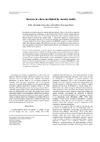Please use this identifier to cite or link to this item:
https://accedacris.ulpgc.es/jspui/handle/10553/59045
| Title: | Success in chess mediated by mental molds | Authors: | Hernández Hernández, Pedro Rodríguez Mateo, Heriberto |
UNESCO Clasification: | 61 Psicología | Issue Date: | 2006 | Journal: | Psicothema | Abstract: | Research has revealed the impact of cognitive-affective strategies (Molds of the Mind) on subjective
well-being, interpersonal relationships, or school achievement. However, it seems odd that such strategies
could influence the success of chess players, because this game is usually considered to be influenced
mainly by technical and cognitive skills. To examine the influence of cognitive-affective
molds, 53 chess players, ages from 9 to 16 years old, enrolled in sport competitions, were assigned to
two groups, high and low success. They responded to the MOLDES, designed to evaluate individuals’
molds. The results show that the «Mental Molds» of the most successful players are more realistic, positive
and regulators of the emotions, while the molds of the less successful players are more evasive,
magic, defensive and inoperative. El éxito en ajedrez explicado por los moldes mentales. La investigación pasada ha demostrado que las estrategias cognitivo-afectivas (Moldes de la Mente) explican, en gran medida, el bienestar subjetivo, las relaciones interpersonales y el rendimiento académico. Por esta razón, parece razonable esperar que tales estrategias deban influir significativamente sobre el éxito de los jugadores de ajedrez, a pesar de la creencia de que este juego está determinado por el uso de habilidades cognitivas y técnicas. Con el fin de examinar esta hipótesis, 53 jugadores de ajedrez, de entre 9 y 16 años, fueron asignados a dos grupos de rendimiento ajedrecístico (alto y bajo), aplicándoseles el cuestionario MOLDES. Los resultados muestran que los Moldes Mentales de los jugadores exitosos son más realistas, positivos y reguladores de las emociones, mientras que los de los jugadores menos exitosos son más evasivos, mágicos, defensivos e inoperantes. |
URI: | https://accedacris.ulpgc.es/handle/10553/59045 | ISSN: | 0214-9915 | Source: | Psicothema [ISSN 0214-9915], v. 18 (4), p. 704-710 | URL: | http://dialnet.unirioja.es/servlet/articulo?codigo=2135895 |
| Appears in Collections: | Artículos |
Page view(s)
25
checked on Jan 11, 2026
Download(s)
15
checked on Jan 11, 2026
Google ScholarTM
Check
Share
Export metadata
Items in accedaCRIS are protected by copyright, with all rights reserved, unless otherwise indicated.
